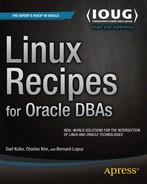Successful organizations utilize data to gain insights about their operations to make better decisions and discover new growth opportunities. Gathering and storing data and extracting business intelligence are critical for success in today's competitive environment. Server technologies and database software are used in combination to transform information assets into profitable actions.
The databases that house important business data require a stable and effective operating platform. The Linux operating system continues to build momentum as a cost-effective and reliable database server. Year after year, more companies report success stories of migrating from expensive hardware to commodity servers running a flavor of the Linux operating system such as Red Hat, SUSE, or Oracle Enterprise Linux. More and more Fortune 1000 companies are embracing Linux as part of their enterprise solution to address today's dynamic business requirements. Linux has repeatedly proven itself to be a viable operating system for mission-critical applications and databases.
As a database administrator, it's inevitable that you will shoulder the responsibility of implementing and maintaining corporate databases on Linux boxes. Your job depends on your ability to work seamlessly with the server hosting your databases. The more you understand about the operating system and tools, the better you'll be able to perform. The best DBAs are the ones who know how to use which operating system features in which situations.
This book provides you with task-oriented, ready-made solutions for Oracle DBAs in a Linux environment. We cover Linux topics from the DBA's perspective of utilizing the operating system. You don't have to read the book cover to cover. Rather, each recipe is a how-to guide for a particular problem. This format allows you to focus on a Linux/Oracle topic and its corresponding solution.
This book is for database administrators who work in Linux/Unix environments. We focus on command-line tools and techniques for working with the operating system from a DBA's viewpoint. If you're a DBA who wants to operate expertly with Linux technology, then this book is for you. Whether you are new or experienced, you'll find solutions for the gamut of tasks that DBAs perform on Linux servers.
Each recipe title acts as pointer to the problem at hand. Each recipe contains a to-the-point solution and a detailed explanation of how it works. The first few chapters are introductory topics for database administrators working in Linux/Unix environments. These first chapters provide the foundation for the more complex topics covered later in the book. Subsequent chapters cover advanced technical topics. These chapters build on the foundation material and allow you to expertly leverage the Linux operating system.
The following typographical conventions are used in this book:
$is used to denote Linux commands that can be run by the owner of the Oracle binaries (usually named oracle).#is used to denote Linux commands that should be run as the root user.Italic is used to highlight a new concept or word.
Monospaced fontis used for code examples, utility names, file names, and directory paths.UPPERCASEindicates view names, column names, and column values.Constant width boldis used to highlight the statements being discussed.
Whether you have a powerful Linux server or an old Pentium III box, you can use the following web sites to download the Oracle Enterprise Linux (OEL) operating system and Oracle relational database management system (RDBMS) software:
Download OEL from the E-Delivery web site:
http://edelivery.oracle.com/linux. This web site has instructions on how to download and install Oracle Enterprise Linux and Oracle VM products.Obtain the RDBMS and documentation at Oracle Technology Network:
http://otn.oracle.com. From this web site, you can obtain the latest versions of Oracle for the various supported operating systems and hardware platforms.
We value your input. We'd like to know what you like about the book and what you don't like about it. You can send us comments via email to [email protected]. When providing feedback, please make sure you include the title of the book in your note to us.
We've tried to make this book as error free as possible. However, mistakes happen. If you find any type of an error in this book, whether it be a typo or an erroneous command, please let us know about it. Please e-mail the problem to [email protected]. Your information will be validated and posted on the errata page to be used in subsequent editions of the book. The corrigendum can be viewed on the book's web page at http://www.apress.com.
You can contact us directly at the following e-mail addresses:
Darl Kuhn: [email protected]
Charles Kim: [email protected]
Bernard Lopuz: [email protected]
In addition, Charles Kim maintains a web site and a blog at http://www.dbaexpert.com and http://blog.dbaexpert.com, respectively. Bernard's web site is at http://www.geocities.com/bslopuz/.
